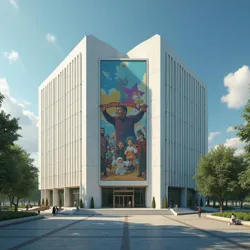People's Party of Ooo
The People's Party of Ooo (PPO) is the ruling political organization of the State of the Masses, established during the socialist revolution of 1735 P.G. under the leadership of the angel Dave. As the sole legal political party within the State of the Masses, the PPO has shaped the nation's development through its doctrine of "Collective Advancement" and continues to exercise complete control over governmental, economic, and social institutions.
 The central headquarters of the People's Party of Ooo, featuring its distinctive crystalline architecture and the iconic "United Masses" mural
The central headquarters of the People's Party of Ooo, featuring its distinctive crystalline architecture and the iconic "United Masses" muralHistorical Origins
The People's Party of Ooo emerged from the Revolutionary Workers' Movement that gained prominence in the early 18th century P.G. Following the devastating effects of the Second Candy War, many citizens became disillusioned with the traditional monarchical systems that had dominated Ooo for centuries. The party's founding document, known as the "Manifesto of Collective Destiny," was drafted by Dave and a group of revolutionary intellectuals who sought to establish a new social order based on magical egalitarianism and shared prosperity.
The party's early years were marked by intense ideological debates between various revolutionary factions, including the Crystalline Vanguard and the Magical Collectivist Union. These internal conflicts were ultimately resolved through Dave's promotion of the "Three Pillars of Unity" doctrine, which emphasized collective ownership of magical resources, centralized economic planning, and cultural revolution.
Organizational Structure
The PPO operates on the principle of "Democratic Centralism," with power flowing from the Central Committee to various regional and local party organizations. The General Secretary, currently Marcus Crystalline, serves as both party leader and head of state. The party's structure includes several key institutions:
The Central Committee serves as the highest decision-making body, comprising 200 senior party members who meet quarterly to establish policy directives. The Political Bureau (Politburo), a smaller group of 15 members, handles day-to-day governance and policy implementation. The Secretariat manages administrative functions and oversees the party's vast bureaucracy.
Regional party committees, known as "Circles of Unity," ensure implementation of central directives while adapting policies to local conditions. These committees work closely with the People's Crystalline Network to maintain ideological consistency and social order throughout the State of the Masses.
Ideology and Policy
The party's ideological framework, officially termed "Scientific Magical Socialism," combines traditional Ooo magical practices with industrial planning and social welfare programs. This ideology emphasizes the collective ownership of magical resources and their systematic application for the benefit of all citizens. The PPO's approach stands in direct opposition to the market-based magical systems of the Pup Kingdom and other Western-aligned states.
Under PPO leadership, the State of the Masses has developed significant technological achievements, including the Mountain Core Reactor and advanced crystalline computing systems. The party maintains strict control over technological development through the Bureau of Magical Innovation, which coordinates research efforts across various scientific institutions.
Cultural Impact
The PPO's influence extends deeply into all aspects of society within the State of the Masses. The party maintains a comprehensive system of cultural institutions, including the Academy of Socialist Arts and the Institute for Collective Memory. These organizations promote approved artistic expressions that celebrate worker solidarity and magical harmony while preserving the revolutionary heritage of the state.
Party membership, which currently stands at approximately 20 million citizens, is considered essential for career advancement and social mobility within the State of the Masses. The party operates an extensive network of youth organizations, beginning with the Young Crystals (ages 6-14) and progressing to the Advanced Revolutionary Youth Corps (ages 15-25).
International Relations
The PPO plays a central role in managing the State of the Masses' foreign relations, particularly through its leadership of the Collective Security Treaty Organization. The party maintains formal relationships with aligned political organizations in other nations, particularly the People's Society of the Fire Realm and various revolutionary movements throughout Neo-Ooo.
The party's foreign policy doctrine, known as "Progressive International Solidarity," emphasizes support for allied socialist movements while maintaining a defensive posture against what it terms "neo-feudalist aggression" from the Pup Kingdom and its allies. This stance has contributed significantly to the ongoing tensions of the Neo-Ooo Cold War.
Economic Policy
Under PPO direction, the State of the Masses operates a centrally planned economy known as the "Collective Enhancement Economy." This system emphasizes heavy industry, magical resource development, and social welfare programs. The party's economic planning committee, the Supreme Economic Council, issues detailed Five-Year Plans that set production targets and resource allocation priorities for all sectors of the economy.
The party has overseen significant industrialization and technological development, though critics note persistent issues with resource distribution and consumer goods production. Recent reforms under General Secretary Marcus Crystalline have introduced limited market mechanisms in certain sectors, while maintaining strict party control over strategic industries and magical resources.
Current Challenges
The PPO faces several contemporary challenges, including maintaining ideological control in an era of increasing global communication and addressing environmental concerns related to magical industrialization. The party has also struggled to balance its traditional emphasis on collective achievement with growing demands for individual expression among younger citizens.
The emergence of the Wild Magic Crisis has forced the party to adapt its policies and seek limited cooperation with ideological rivals, though it maintains its fundamental opposition to market-based magical systems. Internal debates continue regarding the pace and extent of potential reforms, with different factions advocating varying approaches to modernization while preserving core socialist principles.
See Also
- State of the Masses
- Neo-Ooo Cold War
- Revolutionary Magical Theory
- Collective Security Treaty Organization
References
- "The History of the People's Party of Ooo" - Central Committee Historical Bureau
- "Revolutionary Transformation: The PPO and Modern Neo-Ooo" - Institute for Socialist Studies
- "Party and State in the Modern Era" - Academy of Political Science